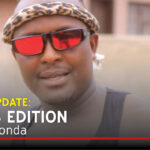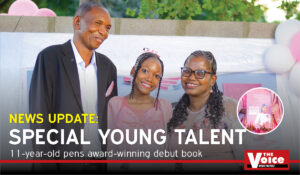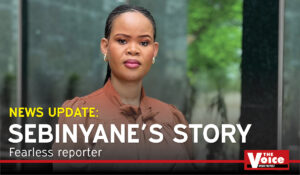Dichi reaches for his dreams
Maxwell Dichi is a renowned actor on the popular South African soap, Muvhango on SABC 2.
On the soapie, the 33-year-old Dichi from Ramotswa plays “Seretse”, a Motswana lawyer based in South Africa who is in a triangle with two cousins Gugu and Imani Nkosi.
He ends up choosing Imani over Gugu.
Dichi and Sharon Seno made waves towards the end of last year when they made it through rigorous auditions to land plum roles on South African screens.
The multimedia designer and owner of Dichi Media has always had a passion and dream to be an actor during times when there was no local television and such dreams appeared far-fetched in Botswana.
His first appearances were in commercials for companies like DStv and Room 50two restaurant.
The reserved lanky dude has also appeared in the local television drama, Colors.
Voice reporter Tshupo Matontshe talked to the rising star about his acting journey, his adventures and what the foreseeable future holds for him.
Q. How did you end up in Muvhango?
A. I saw the Muvhango auditions advertised on Facebook and shared the info with my many friend actors.
We then went to the auditions as a group of friends who had done Colors and other projects together.
There were 2, 000 people there so we spent the whole Saturday there.
I finally got my chance, got in and we did a few lines on the scripts.
Rre Ndlovu asked me if I can grow a beard – first question – and I said “Yeah. I think I can do that.” So he said, “Look, I’m not promising you anything but we’ll call you to come to Jo’burg in a week or two for screen test.
In three weeks we went there with eight others including Sharon Seno who plays Marang.
The next day I was cast as Seretse, Sharon was given the role and in 3 days we started filming.
Q. How did you go from multimedia design to acting?
A. The love for acting has always been there.
As a creative, as a multimedia designer means I somehow had an interest in visual effects; in videography and in motion pictures generally.
But this meant I was working behind the camera and post-production.
So, you could say the passion has always been there as a child, you know like every child watching movies.
Some kids take it as far as wanting to see themselves in movies.
So I guess I was one of those.
Q. You have been an extra, in commercials and in a local drama and now you’re in a big soapie Muvhango, how is the experience different?
A. It’s a huge difference coming from being in a one-time thing – being an extra you appear once in a while and you’re in the background.
Only the people who know you personally will tell you they saw you.
But once you get a role, the whole nation knows you – even though they only know the character you play – and you get a lot of attention; people notice you a lot.
So yeah, it’s a big spectrum compared to just being in the background.
Q. Did you have a job before Muvhango?
A. No. I didn’t have a job.
I quit my job three years ago having been a lecturer at the Limkokwing University of Creative Technology for eight years.
They were retrenching then so I volunteered to be retrenched.
During that time I started putting myself out there.
It gave myself a lot of time to explore.
Q. Duma Ndlovu only allows acting degree holders in his shows; do you think a degree guarantees a good actor?
A. It’s talent and skill.
Let’s take an athlete, he or she comes with talent but they still need to be trained.
Even with acting, it’s talent plus skill.
You might have the talent but you still need to be skilled.
I do agree, there will be a point when a degree speaks more for you.
But then again, just like any other job, there are people with degrees but still suck at what they do. (chuckles).
We never stop learning; I still go for training and workshops.
Q. How difficult it is to play a character that uses a different dialect from yours in Ramotswa?
A. I pay attention a lot to Bangwato when they speak, they have no “l” after their ts nor do they use the “f” sound but its “h” counterpart.
And they have a whole different pronunciation.
So these I put into Seretse, my character.
There are times when I approach my shooting days, I switch to the Ngwato dialect ahead of shooting so that I flow.
Some people do not understand it though, they come to me and ask why I suddenly sound the way I do on TV.
Q. Do you ever watch yourself on TV?
A. Yeah! Yeah. I do.
I am at a stage where I still critic myself – I mean, I don’t think I am the best.
I watch myself and note what I should work on, and I do it as the character I play.
Sometimes you shoot a scene and it feels terrible onset but then when you see it, it looks better.
Sometimes it feels like you did a good job and then the editor kills you – he takes out your good parts and puts in the ones you don’t prefer.
Q. How do you advise creatives to tap into controversies such as political feuds, and corruption allegations going on around the country?
A. Usually I don’t comment on politics because as a public figure you do not want to come across as partisan since we have influence on opinion.
But as a funny way, as creatives we are going to make good movies out of what’s happening.
One thing I can tell you, we have a lot of stories to tell.
Q. You’re working on “The Maxwell Dichi Talk show”. How do you find the time? Has it started already?
A. Before Muvhango – about two years ago – I started a YouTube “vlog” called Session with Dichi and I did it with my brother.
We did one-on-one interviews with the likes of ATI, Mothusi Lesole, and Tshepo Kgositau.
We did about five interviews. So The Maxwell Dichi Talk Show is a revamp of that, it’s the same kind of interview where we want to tell people’s stories but now in front of an audience.
We recently shot two episodes, one with Khumo Kgwaadira.
The second one was shot on the 6th of November, and we had Nigel Amos, Owen Rampha and Mpho Sebina.
We are going to do the third episode on the 5th of December.
It is a dedication to the fight against HIV.
We are hoping to have Kgosi Mosadi; we already have the cast of a documentary called Have it All where they’ll open up about living with HIV.
It is shot once a month, and it’s not difficult because I have filming breaks at Muvhango.
Q. You are one of the interns Steve Harvey selected to work on Family Feud, how does it feel and does it mean goodbye to Muvhango?
A. I feel very fortunate.
This is going to be Family Feud Africa, so it’s going to be filmed in Johannesburg.
I take it as a mentorship programme and I believe what worked for me was the fact that I was already working on The Maxwell Dichi Show.
Whatever I am going to learn on Family Feud will be to come back and beef up my show.
And no, it’s not going to be goodbye to Muvhango.
There will be times I will be afforded time to go and shoot seeing that it’s an internship.
Q. Recently, there were clashes between the South Africans and immigrants in South Africa, how did you feel when you were there being an immigrant yourself?
A. During the first xenophobic attacks, I was in school.
It started in Alexandra; it always starts there for some reason.
I stayed in Bradley – a walking distance from Alexandra.
But what I learnt is that the xenophobia there is never really about Batswana.
It’s South Africans against Nigerians; against Zimbabweans.
Fortunately we never got affected.
I’m not saying it’s a good thing for those who got affected; it’s a horrible thing!
I think people who drive that, are very ignorant seeing that there is no how a country can survive with its people only.
You can fight all you want but Africans will never be separated.
Q. When are you going back to South Africa?
A. I am expected to go any time now.
I believe I will be there in December to continue filming because as I know, there are new stories for Seretse being written.
Steve Harvey will find me on the way. (Laughs).
Q. Before you go, how would you advise local and aspiring artists such that they could penetrate the market?
A. I would just encourage people – whoever they are, whether into music, art – to study what they are doing. Read. Get technical.
The key is in learning.




















